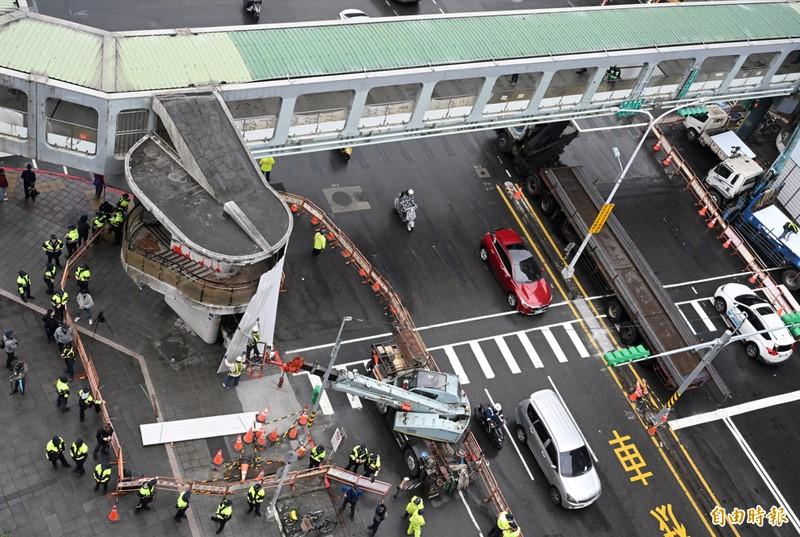The demolition of the Heping-Xinsheng Bridge is to start today and continue until Saturday next week, after it was decided that the bridge does not have cultural heritage value, the Taipei City Government said.
Protesters gathered at the scene after the government announced the decision this morning.
Dozens of police were deployed as the New Construction Office of the Taipei Public Works Department blocked the road and entrances to the bridge.

Photo: Liao Chen-hui, Taipei Times
Art critic Wu Mu-ching (吳牧青), who has lived nearby for 40 years, tried to enter the blocked area and was brought away by the police.
The bridge is an important landmark that symbolizes the city’s collective memory in the 1980s and is seen in numerous films and television shows, Wu said.
The authorities blamed the bridge for a poorly designed traffic route, he added.
He called the government’s action a “raid,” which he described as tantamount to the Chinese Communist Party’s way of doing things.
Protest group Safeguard Heping-Xinsheng Bridge filed an application to review its cultural heritage value in a bid to prevent the bridge from immediate demolition.
Six members of the Cultural Heritage Review Committee were gathered to review the cultural heritage value of the bridge and a site visit was conducted on Wednesday last week after receiving the application on Nov. 5, the Taipei Department of Cultural Affairs said in a news release.
Six committee members were briefed by the applicants, members of the public and relevant authorities on the reason for application, the current state of the building, the structure of the bridge, the demolition plan and complementary measures to determine whether the bridge is of potential cultural heritage value as a monument, historic building, commemorative building, historic site or cultural landscape, it said.
After considering opinions from all sides and having conducted a site visit, the committee members unanimously agreed that the bridge is below the standard to be designated as cultural heritage under the Cultural Heritage Preservation Act (文化資產保存法), it said.
Traffic control is to be in place from 11pm to 6am every day when the demolition is underway, the New Construction Office said in a news release.
Only buses are to be allowed through, while other vehicles are to be directed to use Wenzhou Street and Jianguo S Road during the traffic control period, the government said.
The 42-year-old overpass serves as an elevated walkway over the intersection of Heping and Xinsheng roads.
Located about 500m from National Taiwan Normal University at the southwest corner of Daan Forest Park, the overpass allowed people to walk over the busy multiple-lane intersection for more than four decades.
Despite many residents’ fondness for the functional — if not classically attractive — pedestrian footbridge, the city government last month announced its plan to demolish it.
Additional reporting by CNA

Thirty-five earthquakes have exceeded 5.5 on the Richter scale so far this year, the most in 14 years, the Central Weather Administration (CWA) said on Facebook on Thursday. A large earthquake in Hualien County on April 3 released five times as much the energy as the 921 Earthquake on Sept. 21, 1999, the agency said in its latest earthquake report for this year. Hualien County has had the most national earthquake alerts so far this year at 64, with Yilan County second with 23 and Changhua County third with nine, the agency said. The April 3 earthquake was what caused the increase in

INTIMIDATION: In addition to the likely military drills near Taiwan, China has also been waging a disinformation campaign to sow division between Taiwan and the US Beijing is poised to encircle Taiwan proper in military exercise “Joint Sword-2024C,” starting today or tomorrow, as President William Lai (賴清德) returns from his visit to diplomatic allies in the Pacific, a national security official said yesterday. Commenting on condition of anonymity, the official said that multiple intelligence sources showed that China is “highly likely” to launch new drills around Taiwan. Although the drills’ scale is unknown, there is little doubt that they are part of the military activities China initiated before Lai’s departure, they said. Beijing at the same time is conducting information warfare by fanning skepticism of the US and

Chinese President Xi Jinping (習近平) is unlikely to attempt an invasion of Taiwan during US president-elect Donald Trump’s time in office, Taiwanese and foreign academics said on Friday. Trump is set to begin his second term early next year. Xi’s ambition to establish China as a “true world power” has intensified over the years, but he would not initiate an invasion of Taiwan “in the near future,” as his top priority is to maintain the regime and his power, not unification, Tokyo Woman’s Christian University distinguished visiting professor and contemporary Chinese politics expert Akio Takahara said. Takahara made the comment at a

DEFENSE: This month’s shipment of 38 modern M1A2T tanks would begin to replace the US-made M60A3 and indigenous CM11 tanks, whose designs date to the 1980s The M1A2T tanks that Taiwan expects to take delivery of later this month are to spark a “qualitative leap” in the operational capabilities of the nation’s armored forces, a retired general told the Liberty Times (sister paper of the Taipei Times) in an interview published yesterday. On Tuesday, the army in a statement said it anticipates receiving the first batch of 38 M1A2T Abrams main battle tanks from the US, out of 108 tanks ordered, in the coming weeks. The M1 Abrams main battle tank is a generation ahead of the Taiwanese army’s US-made M60A3 and indigenously developed CM11 tanks, which have